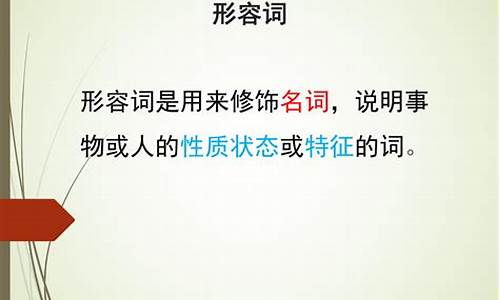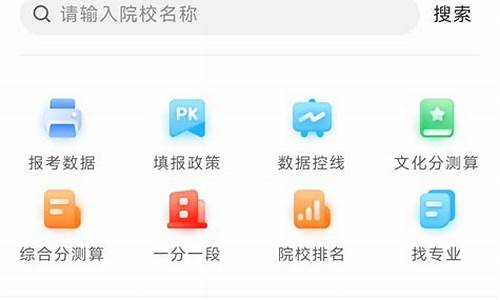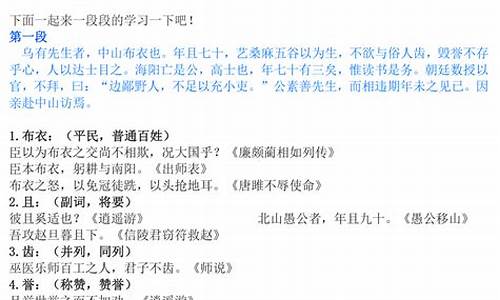您现在的位置是: 首页 > 招生信息 招生信息
高三形容词副词公开课_高考形容词副词课件
tamoadmin 2024-05-31 人已围观
简介1.高中英语语法梳理:形容词和副词2.形容词和副词的相关内容3.形容词变副词副词和形容词都是十大词性之一,都属于实词。虽然它们都主要起修饰作用,可是它们之间有很大的差异,具体区别如下:一、概念不同1、副词是用来表示行为或状态特征的词类。例句1:She‘s listening to music quietly.(她正在安静地听音乐。)副词quietly在句中表示主语听音乐这个行为的特征。例句2:He
1.高中英语语法梳理:形容词和副词
2.形容词和副词的相关内容
3.形容词变副词

副词和形容词都是十大词性之一,都属于实词。虽然它们都主要起修饰作用,可是它们之间有很大的差异,具体区别如下:
一、概念不同
1、副词是用来表示行为或状态特征的词类。
例句1:She's listening to music quietly.(她正在安静地听音乐。)
副词quietly在句中表示主语听音乐这个行为的特征。
例句2:He's there.(他在那儿。)
副词there在句中表示主语的状态特征。
2、形容词是用来表示人或者事物性质、状态和特征的词类。
例句:He is tall.(他很高。)
形容词tall在句中表示主语的特征。
二、修饰对象不同
1、副词主要修饰形容词,副词,动词甚至句子,有少量副词还可以修饰名词。
例句1:The box is too heavy.(这个箱子太重了。)
副词too在句中修饰形容词heavy。
例句2:He did it quite well.(他做得相当好。)
副词quite在句中修饰副词well。
例句3:He runs fast.(他跑得快。)
副词fast在句中修饰动词run。
例句4:Luckily,I'm good at English.(幸好我擅长英语。)
副词luckily在这里修饰整个句子。
例句5:People here like helping each other.(这里的人喜欢互相帮助。)
副词here在句中作定语修饰名词people。
2、形容词主要修饰名词和代词。
例句1:She is a beautiful girl.(她是一个美丽的女孩。)
形容词beautiful在句中修饰名词girl。
例句2:People like something interesting.(人们喜欢有趣的东西。)
形容词interesting在句中修饰不定代词something。
三、构成方式不同
1、形容词主要有三种构成方式:
(1) 本身构成,例如red,big等
(2) 名词或动词加上不同后缀构成,例如windy,wonderful,friendly等
(3) 多个词之间加上连字符合成,例如good-looking,nine-year-old等
2、副词主要有四种种构成方式:
(1) 本身构成,例如here,now等
(2) 形容词加后缀-ly变化而来,例如quickly,fully,truly,easily等
(3) 和形容词同形,例如high,early等
(4) 副词加后缀-ly构成,例如nearly,lately,highly等
四、最高级用法不同
1、副词最高级前面一般省略定冠词the。
例句:He likes the book (the) best.(他最喜欢这本书。)
句中副词最高级best前的定冠词the可以省略。
2、形容词最高级前面一般不能省略定冠词the。
例句:Mike is the tallest student in his class.(迈克是他班里个子最高的学生。)
句中形容词最高级tallest不能省略它前面的定冠词the。
五、位置自由度不同
1、副词在句中位置非常灵活,根据需要既可以位于句首,也可以在句中,甚至在句末。其位置既能以词为中心,也能以句子为中心。
例句:He went to the park yesterday.=Yesterday he went to the park.
他昨天去了公园。
高中英语语法梳理:形容词和副词
副词可以作状语修饰中心语,形容词也可以作状语。二者的区别在于:
第一,形容词能单独成句,而副词一般不能单独成句。
第二,形容词能作谓语、定语、状语,副词一般只能作状语。
第三,形容词一般可以受副词“很”的修饰,副词则不行。
第四,形容词可以修饰名词,副词修饰名词的情况比较少。
副词与形容词的区别:
(1)形容词可以以同样的意义做谓语,可以再加程度副词,有时还可做补语,副词不能。如:
a·事情的发生很偶然。
b·这件事发生得太突然了。
a中的"偶然"不能换成"偶尔"。B中的"突然"不能换成"忽然"。可见,"偶尔"、"忽然"是副词,"偶然"、"突然"·是形容词。
(2)形容词还可以以同样的意义修饰各词,副词不能。例:?
c·突然事件。
d·必然结果。
其中的"突然"不能换成"忽然","必然"不能换成“必定”或“必须”等。
(3)“白、老、净、怪、偏、直、硬”等,虽然既可做谓语义可做定语,也可做状语,但它们做谓语或定语时同做状语时,不能保持意义上的一致,试比较:“白的墙”和“白跑一趟”,“黄瓜老了”和“他老跑北京”,“道路很直”和“眼皮直跳”。不难看出,每组词语中的两个“白”或两个“老”、“直”等,在意义上毫无联系,它们只是采用了同样的语音形式和书写形式而已,可见,放在动词和形容词前的“白、老、净、怪、偏、直、硬”等是副词。
形容词和副词的相关内容
I. 要点
A. 形容词
1、 形容词的用法
形容词是用来修饰、描绘名词的,通常在句中作定语、表语或宾补,有时还可作状语。如:
He is honest and hardworking.
I found the book interesting.
某些形容词与定冠词连用表示一类人作主语时,谓语通常用复数形式。如:
The rich and the poor live in different parts of the city.
The English like to be with their families.
多个形容词作定语修饰名词的顺序:
冠词+序数词+基数词+性质状态(描述性)+形状大小+新旧老少+颜色+国籍+材料+名词。如:
the second five interesting big new red Chinese wall papers.
2、 形容词比较等级的形式
(1) 规则形式
一般说来,单音节词及少数双音节词在后加-er; -est 来构成比较级和最高级;其他双音节词及多音节词在前加more, most.如:
great-greater-greatest
busy-busier-busiest
important-more important-(the) most important
(2) 不规则形式
good (well)-better-best
bad (ill)-worse-worst
many (much)-more-most
little-less-least
(3) 形容词比较等级的用法
①表示两者的比较,用形容词的比较级+than. 如:
He is cleverer than the other boys.
This one is more beautiful than that one.
②表示两者以上的比较,用"the +形容词最高级(+名词)+of(in) …"如:
He is the cleverest boy in his class.
③表示两者是同等程度,用"as +形容词原级+as". 如:
He is as tall as I.
I have as many books as you.
④ 越… 越…
例如:The more I learn, the happier I am.
⑤ You can never be too careful. 越小心越好
又如:You can never praise the teacher too highly.
你怎么赞扬这个老师也不过分。
⑥ I have never spent a more worrying day.
那一天是最令我担心的一天。
I have never had a better dinner.
这是我吃过的最好的一顿饭。
⑦ My English is no better than yours.
我的英语和你的英语都不怎么样。
B.副词
1、 副词的'种类
(1) 时间副词 如:ago, before, already, just, now, early, late, finally, tomorrow等
(2) 地点副词 如:here, there, near, around, in, out, up, down, back, away, outside等。
(3) 方式副词 如:carefully, angrily, badly, calmly, loudly, quickly, politely, nervously等。
(4) 程度副词 如:almost, nearly, much, greatly, a bit, a little, hardly, so, very等。
2、 副词比较等级的用法
其用法与形容词相似,只是副词最高级前可省略定冠词。如:
Of all the boys he sings (the) most beautifully.
We must work harder.
3、 某些副词在用法上的区别
(1) already, yet, still
already表示某事物已经发生,主要用于肯定句;yet表示期待某事发生,主要用于否定句和疑问句;still表示某事还在进行,主要用于肯定句和疑问句,有时也可用于否定句。如:
We've already watched that film.
I haven't finished my homework yet.
He still works until late every night.
(2) too, as well, also, either
too, as well和 also用于肯定句和疑问句,too和as well多用于口语,一般放在句末,而also多用于书面语,一般放在句中与动词连用。either用于否定句和否定的疑问句,往往放在句末。如:
He went there too.
He didn't go there either.
I like you as well.
I also went there.
(3) hard, hardly
hardly意为"几乎"与hard在词义上完全不同。如:
I work hard every day.
I can hardly remember that.
(4) late, lately
lately意为"最近、近来",late意为"晚、迟"。如:
He never comes late.
Have you been to the museum lately?
II. 例题
例1 Tom's father thinks he is already ____
A high enough B tall enough
C enough high C enough tall
解析:该题正确答案是B。修饰人高用tall, 而建筑物的高用high,并且enough修饰形容词要放在形容词后面。因此该题选B。
例2 ____ the worse I seem to be.
A When I take more medicine
B The more medicine I take
C Taking more of the medicine
D More medicine taken
解析:该题正确答案为B。 "the+形容词比较级+… , the +形容词比较级+…"意为越…,越…。该句意为:吃的药越多,我的病越是加重。
例3"I haven't been to London yet".
"I haven't been there ____".
A too B also C either D neither
解析:该题正确答案为C。 A和B都用于肯定句中。D-neither本身意为否定"两者都不",而C-either则用于否定句中,意为"也"。
例4 Mr. Smith was ____ moved at the news.
A deep B deeply C very deep D quite deeply
解析:该题正确答案为B。 A. deep用于副词时,修饰具体的深,如dig deep,而B-deeply则修饰表示感情色彩的词,如该题为deeply moved.另如deeply regret等。而D-quite和deeply均为副词,不能互相修饰。
形容词变副词
在中考单项选择中形容词也占一定比例,一般考查有关形容词或副词的一些搭配,但绝大部分考查形容词与副词的比较级和最高级。
一、形容词和副词的比较级和最高级
①一般的'比较级和最高级在形容词或副词后加-er或-est,如:small —— smaller —— smallest
②以不发音-e结尾的形容词或副词直接加 –r或 –st,如large —— largest —— largest
③重读闭音节词尾是一个辅音字母的,需双写该辅音字母,再加-er或-est.
④以辅音字母加 y 结尾的形容词和副词,把“y”变“i”,再加 –er或-est.busy——busier——busiesthappy——happier——happiest
但一些双音节及多音节形容词或副词前要加more和most,如:slowly —— more slowly —— most slowlydifficult——more difficult——most difficultbeautiful——more beautiful——most beautiful; 但还有一些不规则的变化:good / well——better——bestmany——more——mostbad / ill / badly ——worse——worstlittle——less——leastfar —— farther / further —— farther / furthest
二、形容词和副词的等比句型
①as…as… 和……一样 I’m as tall as you.
②not as(so)…as 不和…… 一样(在否定句中常用so 来代替as)
如,I can’t run so fast as you.
另外as…as possible 为固定结构,如,as soon as possible, as quickly as possible 等。
在以上两个句型中形容词或副词一定要用原级。
三、形容词和副词的其它句型还有:
①形容词/ 副词 比较级 + than 句型 ,在than 后面的人称代词 用主语和宾语均可。He is older than I / me. 但是如果人称代词后有动词时,则只能用主格形式。如, Tom found more red leaves than I did.
②“the + 比较级, the + 比较级” 结构表示两个变化一起发生。如, The more you learn, the more you’ll know.
③“more and more”结构(指两个形容词比较级用and 连接)表示持续不断的变化。 如: I’m getting thinner and thinner.
四、修饰形容词和副词的比较级的副词要用much, a lot, a little, a bit, far等,very不能和比较级连用。如: The blouse I bought yesterday is a little less expensive. 昨天我买的衬衣比较便宜。To play basketball is far more enjoyable to the boy. 打篮球对于男孩子来说要有趣得多。
五、形容词的一些搭配,
如:be glad / happy/ pleased to do 很高兴做某事be sorry to do 很抱歉,很遗憾做某事be sure to do 一定/相信会做某事be ready to do 准备好做某事,乐于做某事get ready to do 为……做好准备等等。
下面我们来看一些例题。
1.The Yellow River is one of ___ in China.
A. the longest rivers B. the longer river C. the longest riverD. the long river
答案:A
2. Does he speak Chinese ___ his brother?
A. as better as B. as good as C. as well as D. best than
答案:C
3. Which shirt do you like ___, the white one or the blue one?
A. better B. good C. best D. much
答案:A
4. I don’t feel ___ to go to work today. I’m ill.
A. good enough B. well enough C. enough well D. enough good
答案:B
5. Mary would like to spend ___ days on her research.
A. a little more B. a little C. a few more D. much more
答案:C
练习:
1.Be quiet, class! I have ___ to tell you.
A. important anything B. important something
C. anything important D. something important
答案:D
2.This picture book is not ___ that one.
A. so interesting as B. so interesting than
C. as interesting than D. interesting as
答案:A
3.This article is ___ than that one.
A. much easier B. more easier c. much more easier D. more easy
答案:A
4.The Changjiang River is ___ river in China.
A. long B. longest C. the longest D. longer
答案:C
5.You must keep your room ___ and tidy.
A. to clean B. cleaning C. clean D. cleaned
答案:C
形容词变副词的变化规则如下:
1、一般情况下变为副词时直接加“ly”即可。形容词quick变为副词quickly、形容词sad变为副词sadly等等。
2、形容词以e结尾时要去e加“ly”。形容词true变为副词truly、形容词due变为副词duly等等。
3、以辅音字母“y”结尾的形容词如果读|i|,要把字母变y为i再加ly,如果读音为|lail,可以直接加ly。形容词happy变为副词happily、形容词heavy变为副词heavily等;如形容词dry变为副词deyly等等。
4、以“ic”结尾的形容词变为副词要加ally。形容词economic变为副词econonically、形容词basic变为副词basically。
5、以辅音字母加“ie”结尾的形容词,去e加y变副词。形容词simple变为副词simply、形容词terrible变为副词terribly。









